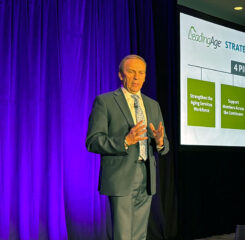New Q&A Discusses Vaccine Access, Property Expenses at HUD Communities
In its first update since the new administration, HUD’s Office of Multifamily Housing released an updated COVID-19 Q&A on April 2. The updated question and answer document discusses testing and vaccine clinics at HUD-assisted communities, as well as use of operating funds for preparedness activities on site. The Q&As also cover allowable medical expenses for residents, treatment in income calculations of the latest round of stimulus checks, tenant income recertifications, and electronic file transmission.
LeadingAge welcomes HUD’s updates to the Q&A as an effort to provide further support and flexibility for housing providers and HUD-assisted residents during COVID-19.
Testing and Vaccine Access at HUD-Assisted Communities
- HUD has begun federal collaborations to facilitate vaccine clinics at HUD communities
- HUD encourages properties to host clinics and testing
- The Q&A emphasizes the need to protect civil rights, privacy protections, and fair housing requirements
- HUD clarifies use of property funds related to vaccine and/or testing access at the property
Facilitating HUD Resident Access to Vaccines and Testing
LeadingAge has been working with HUD and other federal agencies to expand onsite vaccine access for HUD-assisted residents who may experience barriers accessing the COVID-19 vaccine in the community. MF’s April 2 Q&A states:
“HUD has begun efforts to facilitate the delivery of the vaccine to HUD-assisted residents with other federal agencies, local public health officials, health insurers, providers, community-based health organizations, such as Area Agencies on Aging, Centers for Independent Living, and Aging and Disability Resource Centers, and other organizations that may be able to assist residents to access sites that are administering vaccines. HUD is continuing to identify ways to improve vaccine delivery to HUD-assisted households and will provide further guidance as appropriate.”
Civil Rights, Privacy Protections, and Fair Housing Requirements
The Q&A also encourages properties to use property common areas, parking lots, and vacant offices to host vaccine and testing clinics in collaboration with local public health officials and health insurers or providers. The Q&A also emphasizes doing hosting vaccine or testing clinics in a non-discriminatory manner by referencing FEMA’s Civil Rights COVID-19 Checklist. HUD maintains that owners and agents can encourage, but not require, residents to get tested or vaccinated.
HUD also clarified that when hosting a vaccine clinic, non-medical property staff hosting vaccines clinics cannot serve in medical roles, including post-vaccination observation. Housing providers should also be mindful of HIPAA and privacy protections:
“If owners or agents choose to host a vaccination site, HUD encourages owners to be clear with the vaccine provider about the ability or inability of on-site staff to assist with vaccine activities…Non-medical staff should not serve in medical roles (including post-vaccination observation of residents), and owners/agents choosing to host a vaccination site should observe all requirements of the Health Insurance Portability and Accountability Act of 1996 (HIPAA) and its implementing regulations, if applicable, as well as any other confidentiality considerations to ensure that residents’ privacy and medical records are protected, kept confidential, and not placed in resident files.”
Eligible Property Costs
In its updated Q&A, HUD maintains that COVID-19 testing and vaccination costs for both property staff and residents are no eligible costs. However, costs associated with COVID-19 preparedness and response actions, including expenses related to setting up a vaccine clinic onsite, are eligible:
“Multifamily property owners and agents can access property operating accounts for all reasonable and necessary COVID-19 related preparedness and response actions, including supplies, PPE, staff hours, overtime, and hosting a vaccination site at the property. Property funds can be used to cover the following types of expenses associated with operating a vaccination site: materials and supplies needed to set up a site (tents, barriers, etc.), and costs related to providing residents with transportation to and from a site. No advance HUD approval is required to access operating account funds. However, property operating accounts should not be used for purchases of actual vaccines (all COVID-19 vaccines in the United States are currently being purchased by the federal government for administration to recipients without charge to patients or property owners), hiring of medical staff, or other direct medical expenses.”
Property and Resident Finances
- HUD extends annual financial statement due dates
- HUD clarifies the costs of PPE as eligible medical expenses for tenants
- HUD encourages properties to consider extenuating circumstances when setting interim recertification policies during COVID-19
- HUD addresses latest round of stimulus payments and other one-time payments in tenant rent calculations
- HUD emphasizes that EIV information may not be electronically transmitted
Financial Reporting Submissions
After advocacy by LeadingAge and other organizations, HUD recently waived the submission deadline for annual financial reports. The Q&A states:
“HUD has previously issued a COVID-related waiver/extension for projects with an annual financial due date on or before September 30, 2020. This waiver still applies to those properties with due dates that fall in that range. HUD has recently issued an additional waiver for properties with an annual financial due date of October 1, 2020 and later, stating such properties may submit the required financial statement on June 30, 2021 or the regular due date, whichever is later. Note that this waiver does not apply to submissions of financial information that were delinquent as of March 20, 2020.”
Resident Medical Expenses
In response to a question about allowable medical expenses for residents. When calculating the TTP, HUD clarifies that households can include the cost of items used to reduce COVID-19 transmission or risk in their medical expenses dating back to March 2020. The Q&A states:
“Items intended to reduce risk of transmitting illness or preventing illness, including personal protective equipment (PPE), can be an eligible medical expense for tenants when it recommended by the CDC. Items such as face coverings, or PPE (e.g., goggles and gloves), are an eligible medical expense if the item was purchased on or after March 27, 2020, and only for the period during which a national, state, or local COVID-19 emergency is in effect. In addition to being included as current medical expense, eligible families are permitted to include these items as a medical expense retroactive to March 27, 2020 and calculate TTP accordingly.”
Tenant Interim Recertification Policies
The Q&A also discusses the issue of tenant interim income recertifications when a household’s income changes, affecting the tenant portion of the rent. The Q&A addresses retroactive rent reductions when residents report the lost income late or outside of the property’s interim reporting requirements.
HUD encourages properties to consider extenuating circumstances when setting recertification policies:
“When a tenant complies with the interim reporting requirements, the owner/agent must then retroactively apply any reduction in rent starting with the first day of the month after the date of the action that caused the decrease in income. When a tenant does not comply with the interim reporting requirements and the owner discovers the tenant has failed to report the decrease in income, any resulting rent decrease must be implemented effective the first rent period following completion of the recertification. While owners/agents are responsible for setting policies prescribing when and under what conditions a family must report a change in family income or composition, HUD encourages owners to consider extenuating circumstances in setting and implementing recertification policies during the COVID-19 National Emergency.”
Stimulus and Other Payments
Similar to previous rounds of stimulus payments, HUD’s updated Q&A clarifies that the latest round of economic impact payments, unemployment benefits under the Stafford Act, and other one-time stimulus payments are not reportable as tenant annual income:
“Annual income does not include temporary, nonrecurring, or sporadic income. The August 8, 2020 presidential “Memorandum on Authorizing the Other Needs Assistance Program for Major Disaster Declarations Related to Coronavirus Disease 2019” provides temporary unemployment benefits that shall be excluded from income calculations on the basis that the memo authorizes FEMA to provide assistance under the Stafford Act, which is normally excludable income. Any additional future one-time stimulus payments made directly to individuals and families would be excluded from annual income, as they are temporary, nonrecurring payments.”
Electronic Transmission and EIV Information
In 2020, HUD issued guidance to Multifamily Housing properties for use of electronic files and signatures, including file transmission and storage. In the COVID-19 Q&A, HUD emphasizes that Earned Income Verification (EIV) information cannot be shared electronically with independent public auditors:
“HUD’s Computer Matching Agreements do not permit the electronic transmission of EIV information to IPAs. IPAs may access EIV income information only in hard copy files and only within the offices of the owner or management agent. HUD does not have other means of transmitting EIV information to IPAs for financial audits.”

Most Recommended
February 29, 2024
Say Yes to Lobby Day!
April 05, 2024
Cyberattack Updates: Change Healthcare Payment Platform
March 27, 2024
 Colleagues on the Move, March 27, 2024
Colleagues on the Move, March 27, 2024
April 12, 2024
Improving Medicare Advantage
Recently Added
April 17, 2024



